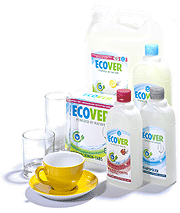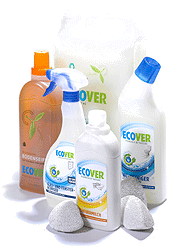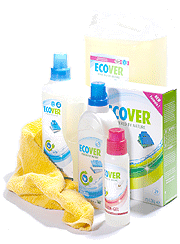Ecover
Washing dishes is unavoidable because it is an integral part of household hygiene. Still, cleaning detergents harm the environment, which can not be avoided but at least it can be limited in several ways. First the question arises whether it is better to do the dishwashing by hand or to use the machine. Whether the one or the other is less harmful to the environment depends on many contributing factors, such as the amount of tableware and its degree of soiling, the chosen rinse cycle, the technical capabilities of the dish washer and last but not least the used detergent. Compared to a modern, energy-saving dish washer, doing the dishes by hand is the less environment-friendly way. Twenty years ago this was not at all the case, but by drastically reducing the needed amounts of water and energy the manufacturers have been able to compensate rising energy, commodity and sewage costs. To run a dish washer efficiently and environmentally, it should be fully loaded. The pieces of table ware should not contact each other and coarse leftovers should be put into the waste instead of the machine. The kind of detergent used is another important ecological factor. Conventional manufacturers of detergents use petrochemical raw materials, but crude oil is - in certain chemical compositions - hardly biodegradable and is a non-renewable resource. Ecover only uses renewable basic materials, which regrow and regenerate, making them inexhaustible. Ecover uses materials of botanical and mineral origins, which are carefully selected to grant an optimal cleaning effect and a maximum biodegradability.
Exaggerated hygiene meanwhile alarms a number of German doctors. Still no one questions modest tidiness, but it is not necessary to sanitize clean living space. The normal variety of germs in a natural environment helps to strengthen our immune system. Mostly unnoticed, it is constantly attacked by bacteria, germs and fungi. Our immune system has an innate system and an adaptive system. The innate system reacts immediately and attacks invaders. The adaptive system has to learn first what is to be attacked but will then be more effective. Scientists assume that a non-activation of this learning process contributes heavily to acquiring allergies. The detergent industry battles stains with an packed arsenal of aggressive silver bullets. Most commonly used buzz words: „antibacterial“ and „antimicrobial“. But as long as there are no ill or freshly operated people around, the use of conventional cleaners instead of germicides is more than sufficient. Also from an ecological standpoint antibacterial and antimicrobial detergents have their drawbacks. Parts of their agents deteriorate the effectiveness of bacteria used in waste water clarifiers. The performance of the clarifiers goes down and more pollutant gets into rivers and streams. Ecover uses only plants or minerals, which are refined to create or enhance their cleaning capabilities. Ecover products influence water life only minimally and are completely and quickly biodegradable.
In Germany more than 35 Million washing machines are in service. No household will survive today without using detergents. Modern detergents show perfect cleaning and care results. The extended lifetime of textiles reduces the need for resources that would have to be needed to produce new ones. But the amount of used detergents in Germany has risen to 700,000,000 kg a year. By using detergents, softeners, bleach, tensides and many more other ingredients get into the waste water. It takes high amounts of technology and energy to eliminate these pollutants in waste water treatments. Ecover goes a different way right from the start. Ecover's detergents clean as good as conventional ones, but additionally they are skin friendly and protect our environment. Ecover products are environment-friendly and biodegradable. Artificial dye, fragrances and preservatives are avoided, which also applies for optical bleach. Vegetable tensides are the washing-active substances in Ecover's detergents. According to German law, producers of detergents have to show that 60% of the washing-active substances used will degrade after 28 days. Ecover goes beyond this. Ecover uses only materials that are degradable by micro organisms in a short time, even in an oxygen-deficient environment, leaving only water, carbon oxide and minerals.
- Ecover Essential Detergent Concentrate Lavender ( 5 liters)
- Ecover Fabric Sensitive Softener Rose and Bergamot ( 750 ml)
- Ecover Fabric Softener Sensitive Apple Blossom and Almond ( 750 ml)
- Ecover Laundry Bleach ( 400 g)
- Ecover Laundry Liquid Wool and Silk Waterlily Honeydew ( 1 liter)
- Ecover Universal Washing Powder Lavender & Eucalyptus ( 1,35 kg)
- Ecover Universal Washing Powder Lavender & Eucalyptus ( 3 kg)
- Ecover Washing Powder Color Concentrate ( 1,35 kg)
- Ecover Washing Powder Color Concentrate ( 3 kg)


